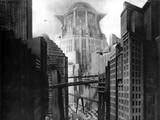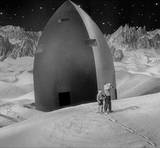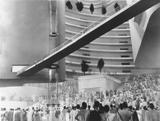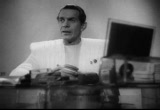Pre-1950s
A Trip to the Moon (Le voyage dans la lune) (1902)
Fantastical vision of a group of astronomers crashing into the moon and fighting off insectoid aliens (Selenites). This silent short is the first science fiction oriented film and was highly popular at the time of its release. Tim Dirks argues that the director, Georges Méliès, intended to criticize the conservative scientists of his day. It's noteworthy that the excellent HBO series, "From the Earth to the Moon" (1998), has a dramatization of Georges Méliès comically making his grand vision of a expedition to the moon while contrasting his vision next to the final Apollo mission (Apollo 17) (and during the sad loss of public interest in the Apollo program).
Starring: Georges Méliès, Victor André, Bleuette Bernon. Based on "From the Earth to the Moon" by Jules Verne and "The First Men in the Moon" by H. G. Wells. Directed by Georges Méliès.
Sources: IMDb | RT | MRQE | Wikipedia | Tim Dirks
Metropolis (1927)
 Envisions a future industrial-city complex in which underground workers rebel (under the direction of a female humanoid and a mad-scientist) against a tyrant tycoon. The mad scientist creates a mechanical robot, but it was imagined prior to digital machines and lacks realistic artificial intelligence.
Envisions a future industrial-city complex in which underground workers rebel (under the direction of a female humanoid and a mad-scientist) against a tyrant tycoon. The mad scientist creates a mechanical robot, but it was imagined prior to digital machines and lacks realistic artificial intelligence.
However, the robot transforms into a beautiful (but devious) Frankenstein monster (perhaps with a 'monster' sense of A.I.), so it reflects the desire of humans to master and control nature as in Shelley's Frankenstein. It also portrays central monitoring and a control desk for invasive workplace supervision.
The SF elements are mostly unimportant to the film's emphasis on the human heart, and Lang, the director, didn't believe in the movie's emotional message – he just liked machines (DVD commentary). But the film is noteworthy for visualizing an early dystopia that becomes the dominant vision for the future in post-1960s SF.
In a classic 1927 review H. G. Wells criticizes Metropolis for its lack of originality and plausibility. He smartly points out that modernity and a technologically advanced society tends to require intelligent workers, not mindless slaves. He describes the movie as anti-rationality; the type of rationality that is generally required to lead to high scientific progress. And he predicts that Metropolis would decrease the demand for SF in the future -- he was correct in one respect; it took until the 50s for SF to grab a share of the broader market. But his surprise at the warm welcome of the movie by film critics of his time lives on in the continued appreciation of it as a classic.
Film critics seem to like it for artistic and emotional reasons. Roger Ebert became ecstatic about Dark City (1998), a movie that reminded him of Metropolis (Ebert's DVD commentary for Dark City). He must be thinking that Dark City has similar emotional and artistic elements to Metropolis because I don't see any similarities in their SF elements at all.
Starring: Alfred Abel, Gustav Fröhlich, Brigitte Helm, Rudolf Klein-Rogge. Based on the novel by Thea von Harbou. Directed by Fritz Lang.
Sources: IMDb | RT | MRQE | Wikipedia | Roger Ebert
Links: Official US Site | Google Directory
By Rocket to the Moon (Frau im Mond) (Woman in the Moon) (1929)
 A rocket team searches for gold on the moon. The movie was popular with some rocket scientists of the time (Hermann Oberth was an advisor on the film) for its emphasis on scientific details. Depicts a launch countdown, a multi-stage rocket, micro gravity in space, and media frenzy for the first moon landing.
A rocket team searches for gold on the moon. The movie was popular with some rocket scientists of the time (Hermann Oberth was an advisor on the film) for its emphasis on scientific details. Depicts a launch countdown, a multi-stage rocket, micro gravity in space, and media frenzy for the first moon landing.
Starring: Klaus Pohl, Willy Fritsch, Gustav von Wangenheim. Based on a novel by Thea von Harbou. Directed by Fritz Lang.
Sources: IMDb | RT | MRQE | Wikipedia | Michael Price
The Invisible Man (1933)
A scientist discovers an invisibility potion (monocane) that produces antisocial side effects, turning him into a maniac and killer. H. G. Wells wasn't satisfied with the SF results, but Rotten Tomatoes is apt in pointing out the film's sharp special effects, high tension, and goofy sense of humor.
Starring: Claude Rains. Based on the novel by H. G. Wells. Directed by James Whale.
Sources: IMDb | RT | MRQE | Wikipedia
Links: Google Directory
H. G. Wells' Things to Come (1936)
 The first two parts reduce to absurdity the rise of wasteful wars and rule by nationalist barbarians. Then the third (and most interesting) part argues that progress and exploration are critical to a meaningful use of our resources and human abilities. The film is noteworthy for themes of scientific progress and freedom, the development of a space program (to the moon and beyond), and a modernized utopia. It has a beautiful Menzies art design, but some mediocre special effects (esp. the toy tanks).
The first two parts reduce to absurdity the rise of wasteful wars and rule by nationalist barbarians. Then the third (and most interesting) part argues that progress and exploration are critical to a meaningful use of our resources and human abilities. The film is noteworthy for themes of scientific progress and freedom, the development of a space program (to the moon and beyond), and a modernized utopia. It has a beautiful Menzies art design, but some mediocre special effects (esp. the toy tanks).
 Some viewers dismiss its speeches and talky dialog as naïve, but others tingle with excitement at its rare and child-like vision of boundless scientific-technological progress. Moreover, it depicts many gadgets that were prescient or inventive: a helicopter, elevators, flat and transparent screens, and wireless and portable intercoms.
Some viewers dismiss its speeches and talky dialog as naïve, but others tingle with excitement at its rare and child-like vision of boundless scientific-technological progress. Moreover, it depicts many gadgets that were prescient or inventive: a helicopter, elevators, flat and transparent screens, and wireless and portable intercoms.
Rich in optimistic SF elements, "Things to Come" captures the zeitgeist of modernity. It has a group of rational minded thinkers, guided by a Einsteinian/Spinozean-like morality, live for scientific advancement and a unified world government. The pro-progress characters (such as the two Cabals) believe humanity could 'live forever' by preserving our experiments and progress for future generations, always standing on our humanity as if on the shoulders of giants.
However, the movie seems naïve about the inevitability of progress and about the plausibility of creating a peaceful society without crime (for extended periods of time). Instead it seems possible that we could revert back to the dark ages or at least become so stagnant in science that we kill ourselves off through overpopulation or through our inability to escape the next major natural disaster. But the film stresses the importance of allowing volunteers to take risks despite public outrage about potential space accidents or deaths. It challenges us to choose the side of progress over our base desires for conformity or safety or comfort:
CABAL: "For MAN no rest and no ending. He must go on--conquest beyond conquest. This little planet and its winds and ways, and all the laws of mind and matter that restrain him. Then the planets about him, and at last out across immensity to the stars. And when he has conquered all the deeps of space and all the mysteries of time--still he will be beginning" (screenplay).
If this vision for progress sounds like a reason to devote all of society to science, then the council members (of the world government) might seem like technocrats. But actually those "technocrats" allow their citizens to become artisans and to pursue other passions freely. Plus the pro-progress council members would have to be suppressed by government bans, laws against science and experiment, and other mandates and restrictions that would turn their critics into the tyrants.
In fact a huge group of rebels in the plot feel belittled by the council's developments of science and technology, so they try to put a stop to progress and an end to the council's freedom to experiment. The progress oriented council will not suppress the free speech of the rebels though, only preparing its 'peace gas' in times of emergency and merely wanting the freedom and space to pursue science.
So it's a story about the freedom to do science, just as much as about the wonders of progress. Many people in our society would actually agree with some of these basic premises, except in cases of social bias (many want to ban cloning, for example) or fear/reason (some believe we aren't ready for advanced science/technology since we might destroy ourselves). But Cabal (the president of the council) has an answer to the problem of danger: "Our [scientific] revolution did not abolish death or danger. It simply made death and danger worth while" (screenplay).
Arthur C. Clarke (author of 2001: A Space Odyssey) suggested this film to Stanley Kubrick as an example of an excellent SF movie (Clarke's special millennial introduction to his 2001 novel). Kubrick hated it, but the late Clarke kept suggesting it at the top of his list whenever someone asked him about the best SF movies.
Starring: Raymond Massey. Based on a novel by H. G. Wells: "The Shape of Things to Come". Directed by William Menzies.
Sources: IMDb | RT | MRQE | Wikipedia | Technovelgy / News | Screenplay
Links: Watch it at the Internet Archive | Comparison to The Jetsons
 We are looking for people with skills or interest in the following areas:
We are looking for people with skills or interest in the following areas:
